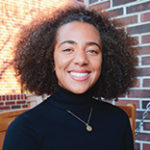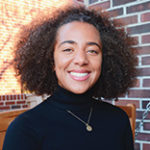Maya Muwanga, 18, who has been involved in African Leadership Group activities for several years, was featured in a recent New York Times article about how Democrats can win the youth vote in November.
Here’s the paragraph featuring Maya from the article:
“As a young person I have a level of cultural fluency, a shared language that I can use without my interactions feeling artificial or contrived,” explained Maya Muwanga, 18, an organizer with New Era Colorado. Because she’s not so far removed in age from high school students, she can imagine the kinds of questions they might ask or issues that might resonate. “Seeing someone visibly younger encouraging voting and working to register young people gets the wheels turning about how this issue might be relevant and not just something for adults,” she added.
 We asked Maya to write a description for us about her work at New Era Colorado, and here is what she sent us:
We asked Maya to write a description for us about her work at New Era Colorado, and here is what she sent us:
In my field work with New Era Colorado, my team and I spent most of our days at high schools. We usually had a table with fun signage, buttons, stickers, and donuts (to attract their attention) set up in some common space where we were registering students to vote. In addition, we did classroom presentations. A “class rap” entails us introducing ourselves, explaining some voter laws in Colorado, and explaining why we think voting, especially by young people, is important.
Along with filling out the voter registration forms, we also have students fill out what’s called a “pledge to vote” card. This is a postcard that we will send reminding them to vote, but it also contains information about how we can stay in touch, like if they would like to receive texts from us, or volunteer to assist us with voter registration when we next visit their school.
The text part is crucial, because as election days near we run a Get Out the Vote text and call campaign. While calling students is always a great way to make sure they have all the information they need to vote, and make voting plans with individuals, and generally get them excited about voting, texting allows us to reach thousands of young people at a time.
We check in with them to make sure they have received their ballots, and have a plan for turning them in, and celebrate with each of them when they have voted. New Era checks-in with students every year for their first three elections, because it’s been proven that once a person votes three times, they are more likely to become a lifelong voter.
Some schools had us do larger assembly-model voter registration, where they bring in all upperclassmen and we have the opportunity to register lots of students in one big wave.
I would say the most important part of our work is the individual conversations we have with students because for many of them we are the first contact they are having with democracy and democratic processes and so it’s crucial that we make the experience positive and educational.
Following the cessation of in-person schooling due to COVID-19, we have been conducting virtual voter registration and election turnout efforts via webinars, phone banks, and text campaigns.
Overall New Era strives to make democracy and voting as accessible as possible by bringing information and the means to register directly to students. Colorado is a national leader in terms of voter accessibility (16 year olds can pre-register, 17 year olds who will be 18 by the time of the general can vote in primaries, automatic mail ballots, newly passed automatic voter registration when one gets their license, robust ballot initiative system), so it is great to be able to share info about all that accessibility with students.
At the same time, voting nationwide and even in states with fairly open laws is still not as convenient/feasible as a civil right should be due to structural barriers that have been erected
Congratulations to Maya and her family, both for her great work with New Era and for having that work recognized in the New York Times.


